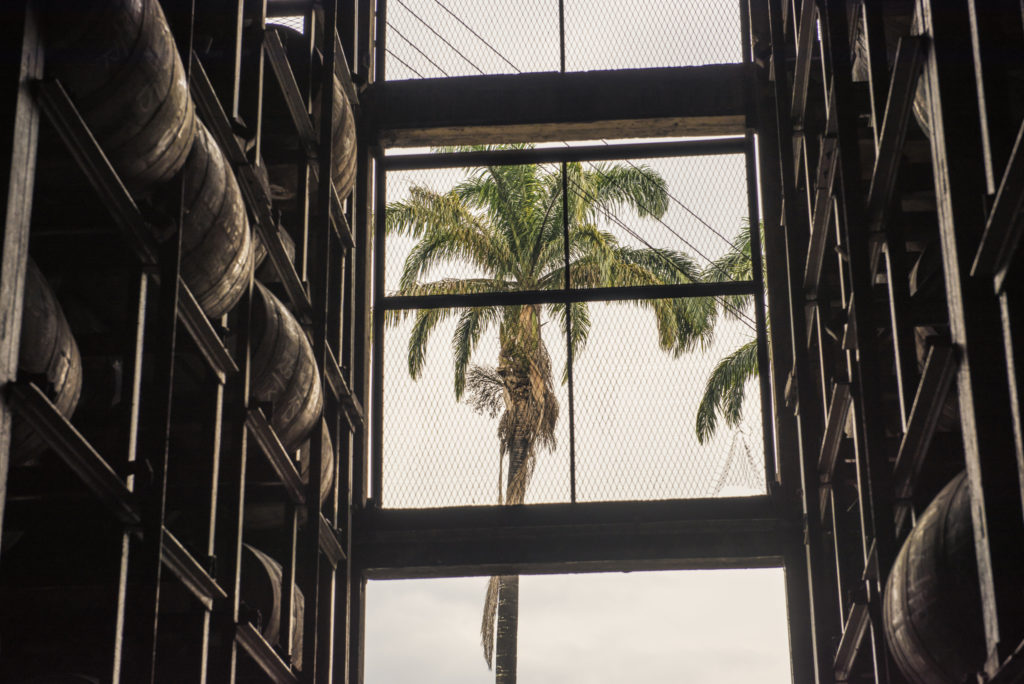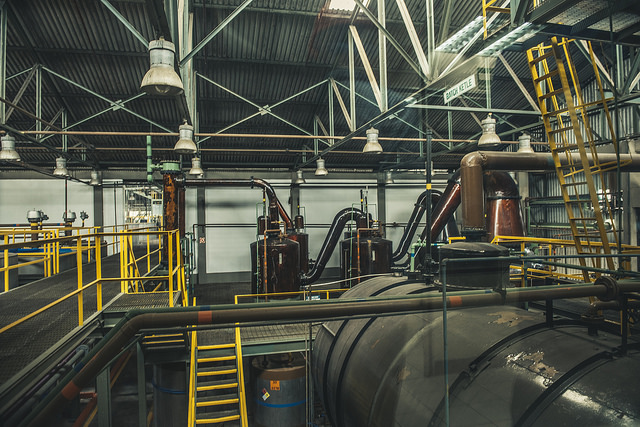Tito Cordero, cellar master for the Venezuelan brand Diplomático, is one of the most talented “Maestro Ronero” or Master Rum Blenders of his generation, as can be seen from the numerous awards bestowed on his creations over the past decade. He played a strong role in the worldwide recognition of his country’s rum expertise, and you could go as far as to say that he has made his mark on the entire rum universe. He is both one of the greatest technical specialists in the industry as well a true sensory artist.
“The production techniques of Diplomático rums are very varied and complex; for me it’s an art.”

Rumporter: How did someone like you, trained as a chemical engineer, become a Master Blender?
Tito Cordero: My first contact with the rum industry was whilst I was doing a work experience placement with the company Licoreras Unidas S.A. (now DUSA) during my chemical engineering studies. In Venezuela, an oil country, the logical route of progression for a chemical engineer is to work in an oil refinery. Once I had qualified, in 1982, I looked for work in the oil industry, where I stayed for 6 years. Later, for personal reasons, I had to move to the Lara region, where the distillery is located. My first thought was to seek work in the distillery where I had completed my work experience several years before. I was hired in April 1988. My journey in the rum industry has been a continuous learning process which has allowed me to develop both personally and professionally. This was a very enriching experience and I am really grateful to the company. Over the years I’ve occupied a range of posts, in production, engineering, quality and supplies, security and environment. I started off as head of spirits production. The experience and knowledge I acquired over all these years has helped me earn the post I now hold: Maestro Ronero for Diplomático rum.
Rumporter: What is the history of the DUSA distillery?
Tito Cordero: The distillery was founded in 1959; an initiative of the main spirit distribution companies in Venezuela and Seagram’s Company LTD, which at the time was one of the main producers and distributers of spirits in the world. The original name of the company was Licoreras Unidas S.A. (LUSA), a company which started off as a multinational and over the years became 100% Venezuelan. In 1992 Seagram’s acquired all of the shares in the company, then in 2001 the alcoholic beverages division of Seagram’s was bought out by Diageo and Pernod Ricard. LUSA then became the property of Diageo. In January 2002, Diageo sold some of LUSA’s assets, including the distillery, the Saruro farm (where the distillery is located) and four spirits brands. In August of the same year, a group of Venezuelan investors with a lot of experience in spirits production bought these assets, which included a brand of premium rum called Diplomático. The society become 100% Venezuelan and renamed itself Destilerias Unidas S.A. (DUSA). In November 2002, DUSA officially signed the acquisition agreement for the society and its assets. For its part, Diageo knew the tradition and expertise of the distillery and, having confidence in the new owners of the company, asked DUSA to continue to produce Cacique rum for the local and international market, and signed a production agreement with them.
Rumporter: How has Diplomático become a brand of international renown?
Tito Cordero: The great Diplomático legacy started with the establishment of a main objective: to produce the best premium rums in the world. From 2002, with the creation of DUSA, some new Diplomático rums were incorporated into the range in order to create a range of Premium and Super premium products. These new products included the Reserva Exclusiva, the Single Vintage and the Ambassador. In 2005, Diplomático began its international venture with a new philosophy of closeness and authenticity for distributers and consumers. Today the brand is available in over 50 countries around the world, and our rums are consistently being recognised and rewarded for their quality.
Rumporter: What does DUSA represent for Venezuelans?
Tito Cordero: Venezuelans are very proud of DUSA. It is a private company, 100% local, which employs over 600 people in a sustainable manner and whose philosophy is to respect the environment whilst making high-quality rums. The brand flies the flag for its country and reinforces its image throughout the world as a producer of premium rum. Personally, DUSA represents a big part of my life. I am very proud to be part of this company, to have contributed to its development and in a way to have been a part of its history.
Rumporter: What are the factors which have most influenced the profile of Diplomático rums?
Tito Cordero: The production techniques of Diplomático rums are extremely varied and complex; for me it’s an art. They combine artisanal and traditional methods with the latest technology, followed by an aging process lasting on average from 2 to 14 years. This results in rums with complex sensory profiles and unique personalities. It is this incomparable palette of aromas and flavours which allows us to create the perfect blend for every occasion, whether it’s to be drunk neat or in cocktails. Terroir also plays an important role in Diplomático’s success. The La Miel region, where the distillery is located, enjoys a microclimate favourable for growing sugarcane, and also for aging rums. Another contributing factor to our success, and no less important, are the men and women who work for the brand. Diplomático rums are the results of their passion, perseverance and above all their love for their trade. Everything has an influence, and it is precisely the combination of all these elements which makes our rum so special and unique.
Rumporter: How did the Denominación de Origen (DOC) Venezuela begin, and what are its objectives?
Tito Cordero: The designation of origin (DOC) Ron de Venezuela (Rum of Venezuela) began following a request from the main rum producers in Venezuela, with the objectives of:
- creating a place for the brand nationally and internationally;
- internationally promoting the quality of Venezuelan rums;
- making their exportation competitive;
- reinforcing the supply chain.
In 2003, the Autonomous Intellectual Property Services (SAPI) established “Ron de Venezuela” as a Controlled Designation of Origin. In order to carry the DOC “Ron de Venezuela”, the following conditions must be met:
- be produced exclusively in the production areas registered by the DOC, in Venezuela (production and transformation of the sugarcane, fermentation, distillation, aging and blending);
- meet the quality standards demanded by the Venezuelan law COVENIN 3040 (production with a base of sugarcane molasses, strength of alcohol between 40 and 50%, aging in oak casks, etc.);
- respect fiscal law on alcohol, according to which rums must be aged for at least two years.
The main outcome of this DOC is uniting the majority of the big rum producers in the country around a common cause: the promotion of the DOC Ron de Venezuela.
Rumporter: Do you think that a new classification of rums could help consumers to understand this complex world?
Tito Cordero: It is true that educating the consumer is essential to improving knowledge of the product and product placement. In terms of a new classification, I’m in favour of this with reference to distillation, since classification already exists for the base material (sugarcane juice, molasses or honey).
Rumporter: Sweet rums, which Diplomático has produced, have been very successful. Should there be more information on rum bottles about the use of sweeteners?
Tito Cordero: The rum market is constantly evolving in order to adapt to consumer demands. It is the consumer who chooses the product that they would like to taste, based on the organoleptic characteristics that they are looking for. It is clear that the rum market is constantly developing and diversifying in present times. You can find sweetened rums, flavoured rums, spiced rums, over-proof, high proof, aged for a long time or, on the contrary, not very long at all. To my mind, what is important is the quality of the product and transparency of the producer about what they are offering, and that the consumer is well-informed about the production of the product which they are about to buy or consume.
Rumporter: Are you currently developing any new products for the Diplomático range?
Tito Cordero: Diplomático is a range of niche rums placed in the premium and super-premium categories. Our objective is to expand our range whilst developing our brand in a sustainable way so that lovers of rum the world over can obtain and appreciate it. Innovation is very important for Diplomático and we will continue to develop new products whilst preserving the brand’s DNA: quality rums produced with the utmost of care.
Rumporter: What do you see for the future of rum?
Tito Cordero: I think that the premium and super-premium rum category is at an all-time high. Circumstances are favourable for it to be able to position itself internationally at the same level as other spirits such as whisky or cognac. Diplomático is one of the brands which have contributed to the change in perception of the rum category and I think that its future is promising, just as it is for other quality rums.


